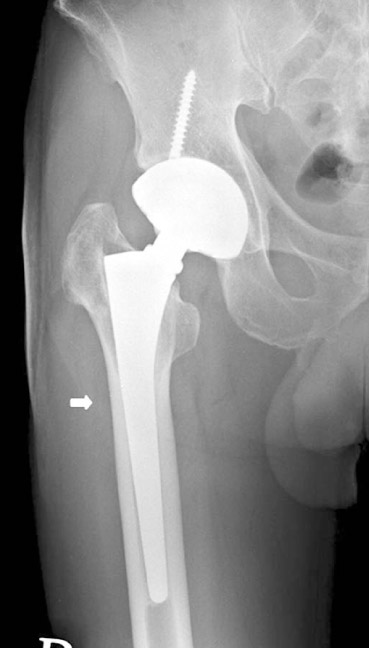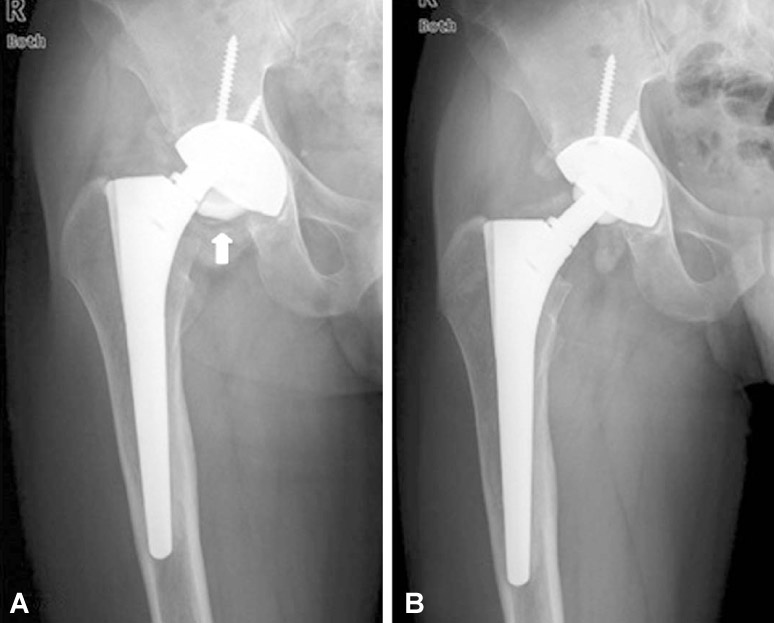J Korean Hip Soc.
2011 Sep;23(3):206-212. 10.5371/jkhs.2011.23.3.206.
Primary Cementless Total Hip Arthroplasty with a Sandwich Type in Ceramic-Ceramic Articulation (Minimum 10-Year Follow up Results)
- Affiliations
-
- 1Department of Orthopedic Surgery, Seoul Medical Center, Seoul, Korea. syback@hanmail.net
- KMID: 2014887
- DOI: http://doi.org/10.5371/jkhs.2011.23.3.206
Abstract
- PURPOSE
To evaluate the minimum 10-year follow up results of primary total hip arthroplasty (THA) performed using a sandwich-type (alumina-polyethylene-titanium) ceramic bearing.
MATERIALS AND METHODS
Thirty four patients (40 hips) who underwent a THA with sandwich typed liners from November 1998 to December 2000 were analyzed. Among the 34 patients, 25 were men and nine were women. Mean follow-up was 134 months (range, 120~145 months) and mean patient age at the time of THA was 47.1 years (range, 24~65 years). The clinical results were evaluated using the Harris hip score and level of thigh pain with a limping gait. The radiographic evaluation was done in terms of the endosteal new bone formation, radiolucent line, subsidence of the stem, migration of the acetabular cup, and proof of loosening.
RESULTS
The mean preoperative Harris hip score of 50.2 points (range, 31~87 points) was improved to 90.9 points (range, 75~99 points) at the final follow-up and thigh pain with limping gait in one case. All cases had fixation by bony ingrowth. No radiographically detectable loosening was observed in any hip. Fracture of ceramic liner in one case required change of the polyethylene liner.
CONCLUSION
At the minimum 10-year follow up, survival rate as the end-point was favorable. However, fracture of the ceramic is still a major problem. Satisfactory results can be obtained by more precise surgical technique for acerabular inclincation and anteversion, and by improving the quality of the ceramic.
MeSH Terms
Figure
Cited by 1 articles
-
Primary Cementless Total Hip Arthroplasty with a Ceramic Sandwich Liner and a Third Zweymüller Stem: Minimum 8-Year Follow up Results
Do-Hyun Moon, Nam-Ki Kim, Il-Whan Wang, Sang-Jin Lee, Jang-Seok Choi
Hip Pelvis. 2014;26(1):14-21. doi: 10.5371/hp.2014.26.1.14.
Reference
-
1. Santavirta S, Nordström D, Metsärinne K, Konttinen YT. Biocompatibility of polyethylene and host response to loosening of cementless total hip replacement. Clin Orthop Relat Res. 1993. 297:100–110.
Article2. Boutin P. Alumina and its use in surgery of the hip. (Experimental study). Presse Med. 1971. 79:639–640.3. Nizard R, Pourreyron D, Raould A, Hannouche D, Sedel L. Alumina-on-alumina hip arthroplasty in patients younger than 30 years old. Clin Orthop Relat Res. 2008. 466:317–323.
Article4. Hannouche D, Zaoui A, Zadegan F, Sedel L, Nizard R. Thirty years of experience with alumina-on-alumina bearings in total hip arthroplasty. Int Orthop. 2011. 35:207–213.
Article5. Harris WH. Traumatic arthritis of the hip after dislocation and acetabular fractures: treatment by mold arthroplasty. An end-result study using a new method of result evaluation. J Bone Joint Surg Am. 1969. 51:737–755.
Article6. Gruen TA, McNeice GM, Amstutz HC. "Modes of failure" of cemented stem-type femoral components: a radiographic analysis of loosening. Clin Orthop Relat Res. 1979. 141:17–27.7. Engh CA, Massin P, Suthers KE. Roentgenographic assessment of the biologic fixation of porous-surfaced femoral components. Clin Orthop Relat Res. 1990. 257:107–128.
Article8. Engh CA, Bobyn JD, Glassman AH. Porous-coated hip replacement. The factors governing bone ingrowth, stress shielding, and clinical results. J Bone Joint Surg Br. 1987. 69:45–55.
Article9. Callaghan JJ, Dysart SH, Savory CG. The uncemented porous-coated anatomic total hip prosthesis. Two-year results of a prospective consecutive series. J Bone Joint Surg Am. 1988. 70:337–346.
Article10. DeLee JG, Charnley J. Radiological demarcation of cemented sockets in total hip replacement. Clin Orthop Relat Res. 1976. 121:20–32.
Article11. Heekin RD, Callaghan JJ, Hopkinson WJ, Savory CG, Xenos JS. The porous-coated anatomic total hip prosthesis, inserted without cement. Results after five to seven years in a prospective study. J Bone Joint Surg Am. 1993. 75:77–91.
Article12. Widmer KH. A simplified method to determine acetabular cup anteversion from plain radiographs. J Arthroplasty. 2004. 19:387–390.
Article13. Kawamura H, Dunbar MJ, Murray P, Bourne RB, Rorabeck CH. The porous coated anatomic total hip replacement. A ten to fourteen-year follow-up study of a cementless total hip arthroplasty. J Bone Joint Surg Am. 2001. 83-A:1333–1338.14. Livermore J, Ilstrup D, Morrey B. Effect of femoral head size on wear of the polyethylene acetabular component. J Bone Joint Surg Am. 1990. 72:518–528.
Article15. Garcia-Cimbrelo E, Martinez-Sayanes JM, Minuesa A, Munuera L. Mittelmeier ceramic-ceramic prosthesis after 10 years. J Arthroplasty. 1996. 11:773–781.
Article16. Nizard RS, Sedel L, Christel P, Meunier A, Soudry M, Witvoet J. Ten-year survivorship of cemented ceramic-ceramic total hip prosthesis. Clin Orthop Relat Res. 1992. 282:53–63.
Article17. D'Antonio J, Capello W, Manley M, Bierbaum B. New experience with alumina-on-alumina ceramic bearings for total hip arthroplasty. J Arthroplasty. 2002. 17:390–397.18. Bizot P, Larrouy M, Witvoet J, Sedel L, Nizard R. Press-fit metal-backed alumina sockets: a minimum 5-year followup study. Clin Orthop Relat Res. 2000. 379:134–142.19. Lee YK, Ha YC, Yoo JJ, Koo KH, Yoon KS, Kim HJ. Alumina-on-alumina total hip arthroplasty: a concise follow-up, at a minimum of ten years, of a previous report. J Bone Joint Surg Am. 2010. 92:1715–1719.20. Dalla PP, Bregant L, Di Marino F. Stiffness of the acetabular cups: a comparative study using the finite element method. Proceedings of the 2nd Symposium on Ceramic Wear Couple. 1997. Stuttgart: Enke;136–138.21. Ravasi F, Sansone V. Five-year follow-up with a ceramic sandwich cup in total hip replacement. Arch Orthop Trauma Surg. 2002. 122:350–353.
Article22. Suzuki K, Matsubara M, Morita S, Muneta T, Shinomiya K. Fracture of a ceramic acetabular insert after ceramic-on-ceramic THA--a case report. Acta Orthop Scand. 2003. 74:101–103.
Article23. Hwang SK, Oh JR, Her MS, Shim YJ, Cho TY, Kwon SM. Fracture-dissociation of ceramic liner. Orthopedics. 2008. 31:804.
Article24. Ha YC, Kim SY, Kim HJ, Yoo JJ, Koo KH. Ceramic liner fracture after cementless alumina-on-alumina total hip arthroplasty. Clin Orthop Relat Res. 2007. 458:106–110.
Article25. Bader R, Willmann G. Range of motion vs position and design. Proceedings 5th International CeramTec Symposium. 2000. 2000 Feb 18-19; Stuttgard, New York: Thieme Verlag;66–74.26. Park YS, Park SJ, Lim SJ. Ten-year results after cementless THA with a sandwich-type alumina ceramic bearing. Orthopedics. 2010. 33:796. doi: 10.3928/01477447-20100924-11.
Article27. Park YS, Hwang SK, Choy WS, Kim YS, Moon YW, Lim SJ. Ceramic failure after total hip arthroplasty with an alumina-on-alumina bearing. J Bone Joint Surg Am. 2006. 88:780–787.
Article28. Hasegawa M, Sudo A, Hirata H, Uchida A. Ceramic acetabular liner fracture in total hip arthroplasty with a ceramic sandwich cup. J Arthroplasty. 2003. 18:658–661.
Article29. Bader R, Steinhauser E, Gradinger R, Willmann G, Mittelmeier W. Computer-based motion simulation of total hip prostheses with ceramic-on-ceramic wear couple. Analysis of implant design andorientation as influence parameters. Z Orthop Ihre Grenzgeb. 2002. 140:310–316.
Article30. Nishii T, Sugano N, Miki H, Koyama T, Takao M, Yoshikawa H. Influence of component positions on dislocation: computed tomographic evaluations in a consecutive series of total hip arthroplasty. J Arthroplasty. 2004. 19:162–166.31. Duncan CP, Masri BA. Fractures of the femur after hip replacement. Instr Course Lect. 1995. 44:293–304.32. Garbuz DS, Masri BA, Duncan CP. Periprosthetic fractures of the femur: principles of prevention and management. Instr Course Lect. 1998. 47:237–242.33. Berry DJ. Unstable total hip arthroplasty: detailed overview. Instr Course Lect. 2001. 50:265–274.34. Woo RY, Morrey BF. Dislocations after total hip arthroplasty. J Bone Joint Surg Am. 1982. 64:1295–1306.
Article
- Full Text Links
- Actions
-
Cited
- CITED
-
- Close
- Share
- Similar articles
-
- Short-term Results of Cementless Ceramic-on-ceramic Articulation Total Hip Arthroplasty
- Cementless Total Hip Arthroplasty Using a Ceramic on Ceramic Bearing Surface: The Clinical Results of a Minimum 10-year Follow-up for Patients with Short Term Follow-up
- Short-term Results of Cementless Total Hip Arthroplasty Using Ceramic on Ceramic Articulation
- Ceramic on Sandwich Ceramic Bearing Primary Cementless Total Hip Arthroplasty (Result of 2 to 5 years follow up)
- Cementless Total Hip Arthroplasty using Ceramic-on-ceramic Osteonics(R) System: Minimum 8-year Follow up Results



